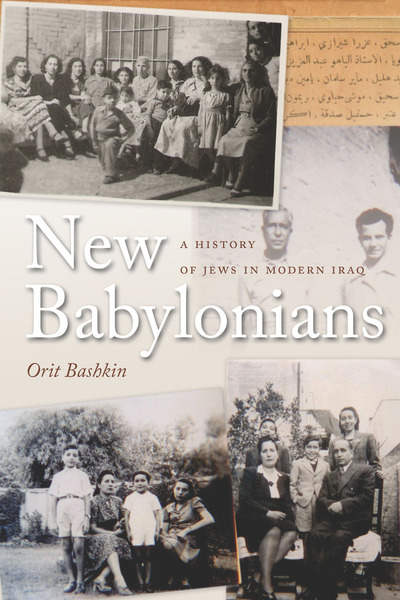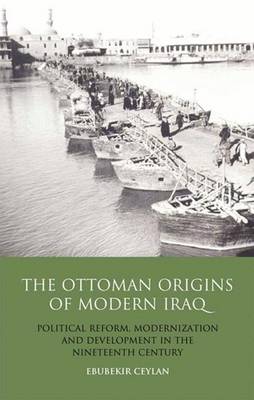-
Add to cartQuick view
Orit Bashkin, New Babylonians: A History of Jews in Modern Iraq Stanford: Stanford University Press, 2012. 328 pp.
Orit Bashkin, New Babylonians: A History of Jews in Modern Iraq. Stanford: Stanford University Press, 2012. 328 pp.
$5.00Free!Add to cartQuick view -
Add to cartQuick view
Ebubekir Ceylan, The Ottoman Origins of Modern Iraq: Political Reform, Modernization and Development in the Nineteenth-Century Middle East. Library of Ottoman Studies, London and New York: I. B. Tauris, 2011, 297 pp.
Ebubekir Ceylan, The Ottoman Origins of Modern Iraq: Political Reform, Modernization and Development in the Nineteenth-Century Middle East. Library of Ottoman Studies, London and New York: I. B. Tauris, 2011, 297 pp.
$5.00Free!Add to cartQuick view -
Add to cartQuick view
Between Cultural and National Nahda: Jewish Intellectuals in Baghdad and the Nation-Building Process in Iraq
Free!This article focuses on the role of Jewish intellectuals in defining a national and cultural identity for their coreligionists in Iraq during the establishment of the state by the British in the years 1921 until 1932. Based primarily on their contributions in the press, their poetry and memoirs, this article discusses the responsibility that Iraqi Jewish thinkers and writers took on themselves in order to participate in the national and literary revival, the Nahda, from which they hoped the entire Jewish community would benefit. Their responses to anti-imperialist debates in Iraqi intellectual circles and stance on sectarianism and secularism is examined through analysis of the themes and terminologies used by three Baghdadi Jewish intellectuals: Nissim Susa (1900-1982) Anwar Sha’ul (1904-1984), and Mir Basri (1911-2006). Is there a common trend among these three regarding their perception of the nation? How is writing employed to foster national consciousness?
Add to cartQuick view -
Add to cartQuick view
The Iraqi Novel and the Christians of Iraq
Free!After the toppling of Saddam Hussein’s authoritarian regime in 2003, the Christian communities of Iraq faced forced emigration. In this article I examine how the Christians of Iraq and their recent precarious situation are reflected in the Iraqi novel. First, I set the political and conceptual grounds with an exposition of the debate over the place of Christians in the Iraqi nation, as discussed by two Iraqi intellectuals belonging to the Sunni and Shi‘i Muslim traditions. This debate frames the liberal political discourse on the Christians and thus provides a framework for the analysis of the novels, the main focus of the article. Iraqi novelists are less refined than intellectuals and politicians in their exposition of views about Christians, or in the case of Christian novelists, their views of their own community and of Iraqi Muslims. I examine representations of Christians in novels written by both Muslim and Christian Iraqi writers, as well as how novels by Christian Iraqi writers reflect the controversy they live with and the crisis of their identity vis à vis their community and its current place in Iraq. What emerges is that increasing numbers of Christians question both their alliance with the Arabs in Iraq and, even more so, their Arab identity. For various reasons Arab Muslim intellectuals find this difficult to accept.
Add to cartQuick view
- Home
- About JLS
- Issues
- Vol. 9 No. 1 | Summer 2019
- Vol 8 No 2 Winter 2018
- Vol. 8, No. 1: Summer 2018
- Vol. 7, No. 2: Winter 2017
- Vol. 7, 1: Summer 2017
- Vol. 6, Summer/Winter 2016
- Vol. 5, No. 2 Winter 2015
- Vol. 5, No. 1 Summer 2015
- Vol. 4, No. 2 Winter 2014
- Vol. 4, No. 1 Summer 2014
- Vol. 3, No. 2 Winter 2013
- Vol. 3, No. 1 Summer 2013
- Vol. 2, No. 2 Winter 2012
- Vol. 2, No. 1 Summer 2012
- Vol. 1, No. 2 Winter 2011
- Vol. 1, No. 1 Summer 2011
- Blog
- dock-uments
- Subscribe
- Submit
- Contact



